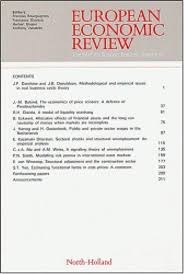
Avdic, D. and \von Hinke Kessler Scholder\, \.(. (2021). Extending alcohol retailers’ opening hours: Evidence from Sweden European Economic Review, 138:.
-
Affiliated authorStephanie von Hinke
-
Publication year2021
-
JournalEuropean Economic Review
Excessive alcohol use is associated with a wide range of adverse outcomes that inflict large societal costs. This paper investigates the impacts of increases in regulated opening hours of Swedish alcohol retailers on alcohol purchases, health and crime outcomes by relating changes in these outcomes in municipalities that increased their retail opening hours to those in municipalities whose opening hours remained unchanged. We show that extended opening hours led to statistically and economically significant increases in alcohol purchases by around two percent per weekly opening hour, but find no corresponding increases in adverse outcomes related to the consumption of alcohol. We study potential mechanisms, such as consumption spillovers and on and off-premise substitution, and we discuss policy implications of our findings.